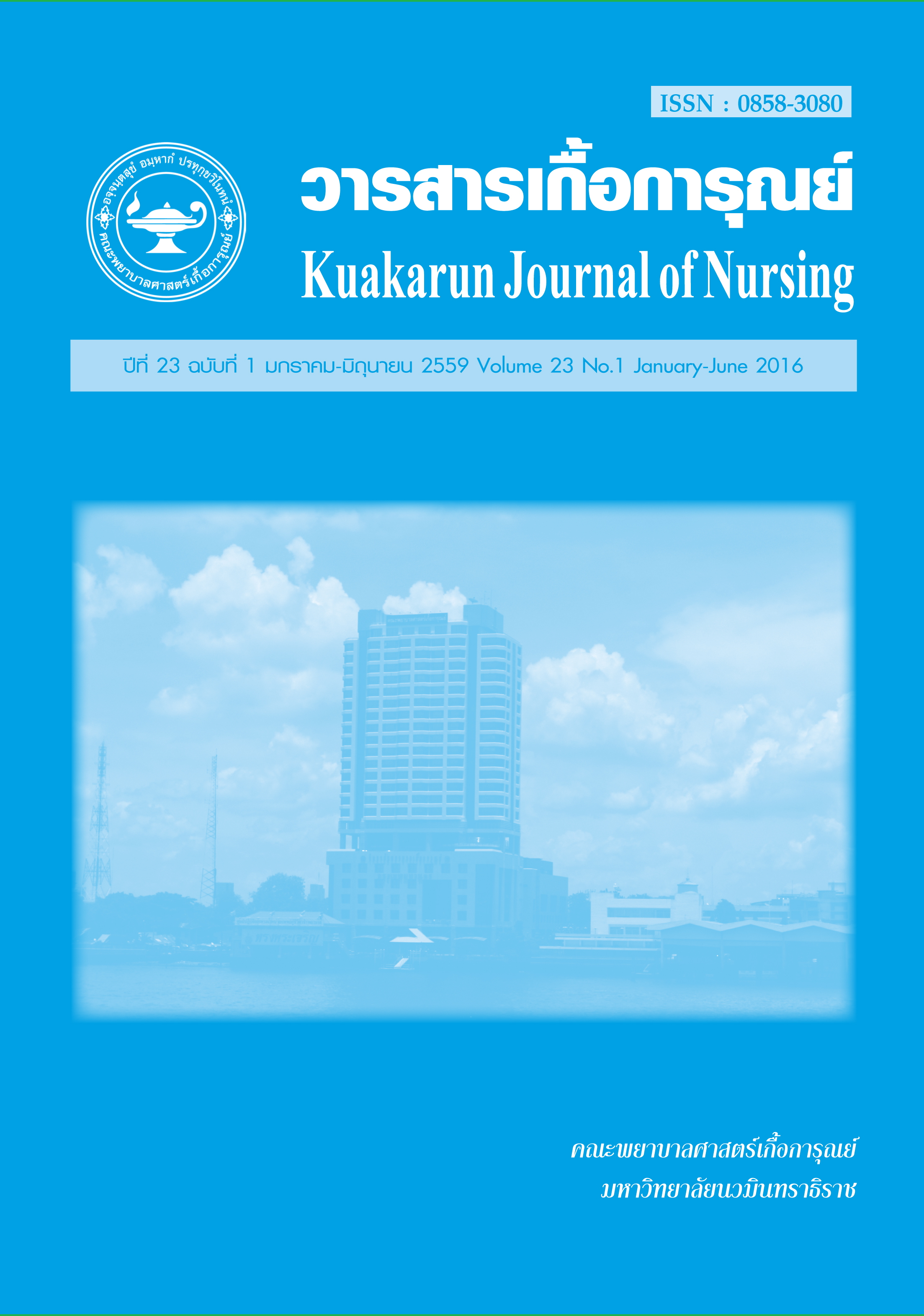ผลของโปรแกรมส่งเสริมการรับรู้สมรรถนะแห่งตนต่อพฤติกรรม การจัดการตนเองของผู้ป่วยโรคหืดวัยผู้ใหญ่ The Effect of Perceived Self-Efficacy Promoting Program on Self-Management Behavior in Asthmatic Adult Patients.
คำสำคัญ:
โรคหืด, การรับรู้สมรรถนะแห่งตน, พฤติกรรมการจัดการตนเองบทคัดย่อ
การวิจัยกึ่งทดลองนี้ มีวัตถุประสงค์เพื่อศึกษาผลของโปรแกรมส่งเสริมการรับรู้สมรรถนะแห่งตนต่อพฤติกรรมการจัดการตนเองของผู้ป่วยโรคหืดวัยผู้ใหญ่ ตามทฤษฎีการรับรู้สมรรถนะแห่งตนของ Bandura (1997) และแนวคิดพฤติกรรมการจัดการตนเองของผู้ป่วยโรคหืดวัยผู้ใหญ่ ของ Tobin, et al. (1986) กลุ่มตัวอย่างเป็นผู้ป่วยโรคหืดวัยผู้ใหญ่อายุ 18 – 59 ปี ที่มารับการรักษาในคลินิกโรคหืด โรงพยาบาลแก่งกระจาน แบ่งเป็นกลุ่มควบคุมและกลุ่มทดลองกลุ่มละ 22 คน โดยจับคู่ อายุ เพศ และระดับการควบคุมโรคหืดเหมือนกัน กลุ่มควบคุมได้รับการพยาบาลตามปกติ และกลุ่มทดลองได้รับโปรแกรมส่งเสริมการรับรู้สมรรถนะแห่งตน เครื่องมือวิจัยประกอบด้วยโปรแกรมส่งเสรมิ การรับรู้สมรรถนะแห่งตน แบบสอบถามพฤติกรรมการจัดการตนเองของผู้ป่วยโรคหืดวัยผู้ใหญ่ และแบบสอบถามการรับรู้สมรรถนะแห่งตนของผู้ป่วยโรคหืดวัยผู้ใหญ่ โปรแกรมและแบบสอบถามผ่านการตรวจสอบความตรงเชิงเนื้อหาจากผู้ทรงคุณวุฒิ จำนวน 5 คน หาค่าความเที่ยงของแบบสอบถามพฤติกรรมการจัดการตนเอง และแบบสอบถามการรับรู้สมรรถนะแห่งตนของผู้ป่วยโรคหืดวัยผู้ใหญ่ได้เท่ากับ .74 และ .72 ตามลำดับ วิเคราะห์ข้อมูลโดยสถิติเชิงพรรณนา และสถิติทดสอบค่าที
ผลการวิจัยสรุปได้ดังนี้
1. ค่าเฉลี่ยของคะแนนพฤติกรรมการจัดการตนเองของผู้ป่วยโรคหืดวัยผู้ใหญ่ หลังได้รับโปรแกรมส่งเสริมการรับรู้สมรรถนะแห่งตนสูงกว่าก่อนได้รับโปรแกรมส่งเสริมการรับรู้สมรรถนะแห่งตน อย่างมีนัยสำคัญทางสถิติที่ระดับ .05
2. ค่าเฉลี่ยของคะแนนพฤติกรรมการจัดการตนเองของผู้ป่วยโรคหืดวัยผู้ใหญ่ กลุ่มที่ได้รับโปรแกรมส่งเสริมการรับรู้สมรรถนะแห่งตนสูงกว่ากลุ่มที่ได้รับความรู้ตามปกติ อย่างมีนัยสำคัญทางสถิติที่ระดับ .05
3. ผลการวิจัย สามารถนำไปประยุกต์เป็นแนวทางปฏิบัติเพื่อให้ผู้ป่วยโรคหืดวัยผู้ใหญ่มีพฤติกรรมการจัดการตนเองที่ดีได้
The Effect of Perceived Self-Efficacy Promoting Program on Self-Management Behavior in Asthmatic Adult Patients.
This quasi-experimental research aimed to examine the effectiveness of perceived self-efficacy promoting program on self-management behavior in adult patients with asthma, using the self-efficacy theory of Bandura (1997) and the self-management behavior of Tobin, et al. (1896). Adult patients with asthma aged 18-59 years were recruited from the asthma clinic, Kaengkrajan Hospital. Both control (n=22) and the experimental (n=22) groups were matched with age, gender, and the level of asthma control. While the control group received the standard usual care, the experimental group received the perceived self-efficacy promoting program. The content of experimental program, questionnaires of perceived self-efficacy promotion (α=.72) and self-management behavior (α=.74) in adult patients with asthma were validated by five experts. Descriptive statistics and t-test were used to analyze data.
The results revealed that
1. The mean score of self-management behavior in the group of adult patients
with asthma who received the perceived self-efficacy promotion program was higher than that before receiving the program at the statistical level of .05. 2. The mean score of self-management behavior in the group of adult patients with asthma who received the perceived self-efficacy promotion program was higher than that in the group receiving the usual care and knowledge at the statistical level of .05.
This research could be applied with the guideline for adult patients with
asthma to have better self-management.

















